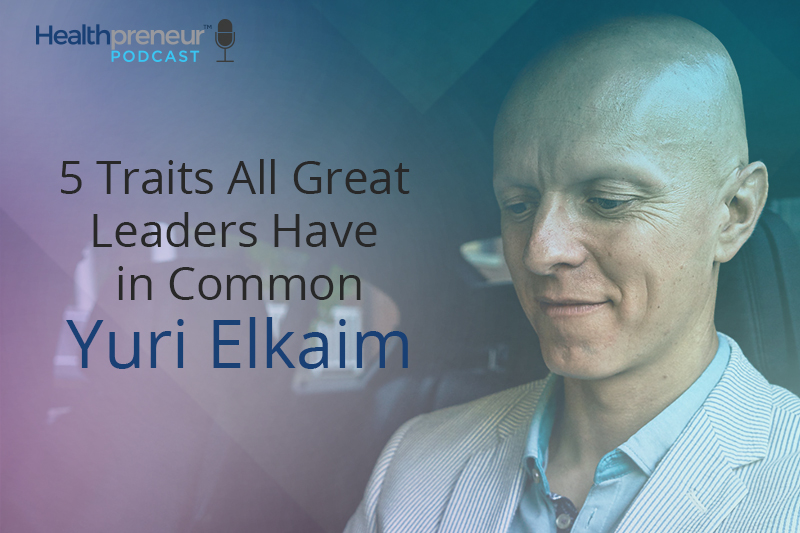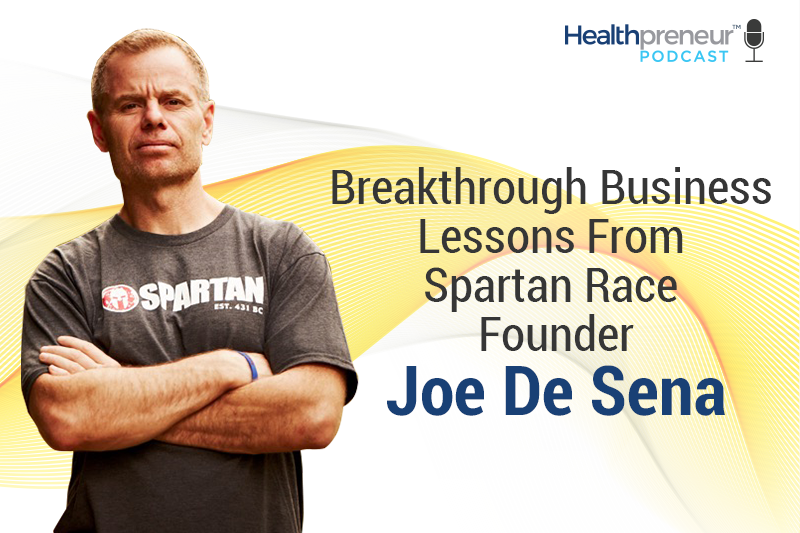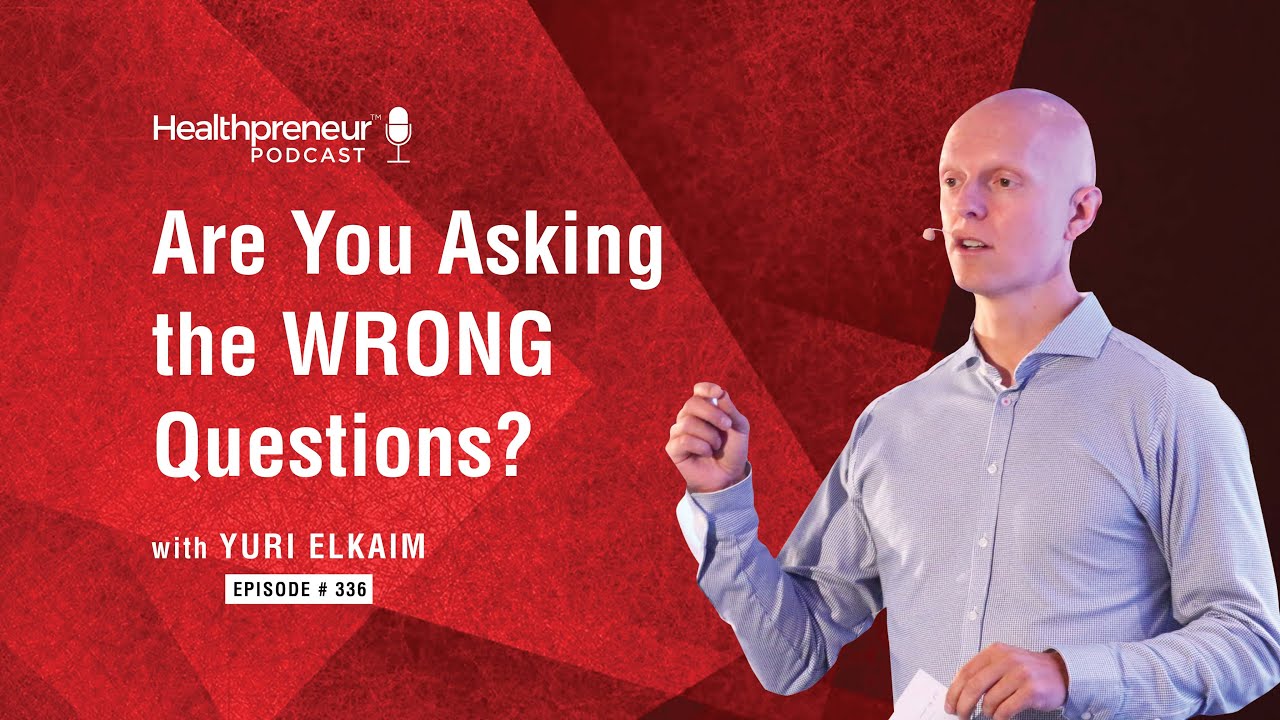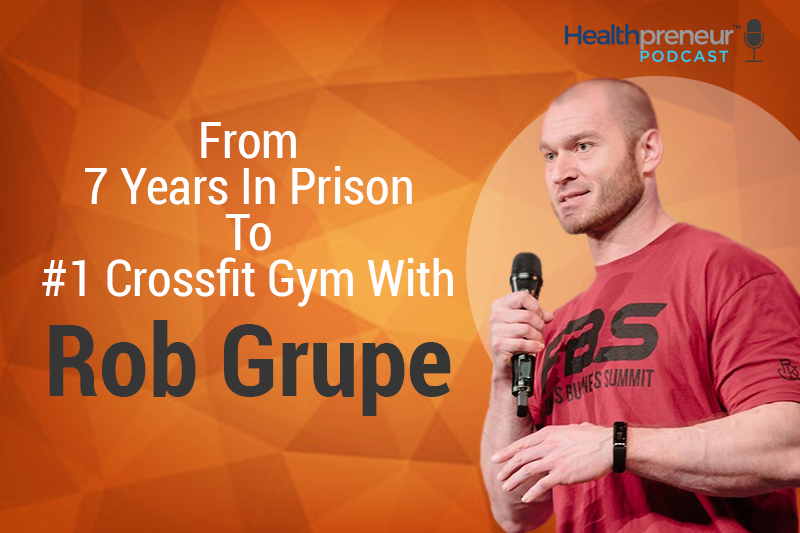5 Traits All Great Leaders Have in Common

You know what time it is, Healthpreneurs! Solo round time! And today, this episode is just for you because I’m talking about the top 5 traits all great leaders have in common. If you want to be a great leader – which I know you do because you’re here – you want to assure you possess all 5 of these traits.
Let’s be real: Not all leaders are great leaders. And that’s why civilizations crumble, companies fail, and employees roll their eyes as their manager walks away. Today I’ll explain why great leaders birth other great leaders. You’ll understand why they focus on the what and why, rather than mulling over the how, and why great leaders are stubborn on the vision and flexible on the strategy.
You’ve got to be decisive but not hung up on the title your power and decision-making brings. Who cares if you’re CEO or the head of the personal training sector of a business? Step up and lead where your leadership is needed, and remember that there’s no “I” in “team.” This episode is for anyone taking on a leadership position in any area of life whether in your family, your business, or your weekend volunteering gig.
In this episode I discuss:
1:00 – 4:30 – Leaders creating leaders
4:30 – 6:30 – Focusing on the what and why
6:30 – 11:00 – Being stubborn on vision and flexible on strategy
11:00 – 14:30 – Decisiveness and speaking with the word “we”.
14:30 – 18:00 – Being the best leader
Transcription
Hey, hey guys, what’s up? Yuri here, welcome back to the show. Hope you’re having a great day, hope your weekend was awesome, and today we are going to be talking about leadership.
We’ll be revealing five truths about great leaders. Five things that great leaders have in common. And whether, you want to look back in the history books, the people like Winston Churchill, or whoever your leader idols are, I think you’ll find some really common themes in what I’m about to share with you. If you’re okay with hit, let’s jump right into this.
1. Leaders creating leaders
The first traits of a great leader, is that they create other leaders, not followers.
Now, if you look at different leaders over history, Mussolini, Hitler, a lot of these dictators, what they tend to have developed, at least it seems like this from the outside, is they develop a lot of followers, right? They develop a lot of people who are obedient. Who don’t ask questions, who just get stuff done.
If that’s the type of leadership that one is employing, the problem with that is number one, it doesn’t really empower people. I think it’s a fear based approach to leadership, which is saying, “You’re doing it this way, or you’re dead.” More, or less. And, I think in today’s day in age, in business, it doesn’t really help you if you are the sole dictator of your business.
Yes, it’s important to delegate things, and outsource things, but you also want to be able to lift people up within your organization. And if your organization is only five people, or two people, that’s totally fine.
One of the things that I’ve recognized over the years, that I really enjoy doing, is building teams. And, this goes back to my days in soccer, when I was playing at the University of Toronto, and actually even prior that with a lot of my club teams, and subsequently at the pro level. I was very often the captain of my team. And I think part of that was because I was a goalie, so naturally goalies have a bit more perspective of what’s happening. They have a bit more of a leadership position, and they can direct everyone.
But, what I really enjoyed doing was, elevating other people and bringing them towards a common cause, and saying, “Hey guys, we’re doing this together, it’s about us, it’s not about me, it’s about us, and we have this common goal and we’re going to make this happen.” And, that’s a really great feeling that I’ve been able to transfer into business.
I’m super grateful for my team with Healthpreneur. I’ve got some of the best coaches on the planet, helping our clients with their mindset. Keeping them on track, helping them overcome different obstacles and self doubt.
Whether, it’s from a copywriting side, or a Facebook advertising side, or the mindset side. I’m super blessed that I have these amazing people on our team. Because what that allows me to do, is it gives me freedom to not have to do everything myself. So, if you want freedom in your life, you have to develop other leaders around you, who are in some ways better than you at certain things. And as a result, they’re going to free up your life to do the things you love to do most in your business, or if you want to take a trip for a little bit, you can do that and the business doesn’t dissolve. So, it’s important to build other leaders.
2. Focusing on the what and why
The second trait or truth of awesome leaders, is that they focus on the what and the why, not the how. We talked about this in one of the previous solo rounds, where I talked about how it’s important not to get stuck in the weeds. It’s important not to spend a lot of your thinking in the minutia. Because that level of thinking, most of us, and maybe you’re the same as me, we’re very airy, visionary, creative thinkers. We don’t like to think about the details. We’re very high level thinking, and we just like to get stuff going. As soon as we start thinking about the granular details, it drains our energy. And so that’s why it’s important to focus on what you want, and why that’s important.
The how is ideally for somebody else to figure out, and that’s why it’s important to create other leaders. So, if you want to say, okay listen, so for instance, I’ll give you an example. I want to grow my Instagram following to 100,000 people within the next five months. Now, that’s a very ambitious goal. Most people don’t even do that over the space of three years. I don’t know how to do that, I really don’t, I have no clue, so there’s a couple of things I can do. I can try to figure out on my own, and that’s where I would say, “How do I do this?” Or, I can focus on the what, which is that goal. I can focus on why it’s important to me and the business. And, just so we’re clear, that has nothing to do with me looking cool because I have 100,000 followers. It’s some very specific reasons that, that’s important for our business.
Instead of my looking at, “Okay, how do I make this happen?” It would make a lot more sense for me to find other people who have done that. And then ask them how they’ve done it, and if it’s something that’s a systemizable, predictable process type of thing. I can hand that off to someone else, or maybe I’ll hire someone to help us out with that. That’s important as a leader, is to focus on the what and the why, not to get stuck in the how. Now, the how, is important, right? You still have to have a process, a strategy in place, but you should not be the one trying to figure this out on your own. You should not be the one paving your own way. It takes a very, very long time. So that’s the second thing.
3. Being stubborn on vision and flexible on strategy
Third is great leaders are stubborn on vision, flexible on strategy. Let me give you a great example.
With Healthpreneur, when we first started, it was three years ago now. We started Healthpreneur, it actually started four years ago, but not really officially. So, this is kind of how it started. I started Healthpreneur, as a really behind the scene, underground, paid newsletter. And I basically sent my email list, I think it was like a semi email list, like a special offer for, try a free month of this newsletter out. And, I was writing newsletters every month, and it was like six or seven dollars a month. I think we had maybe about a hundred or so, subscribers. And it was a physical newsletter that was sent to your front door. So, I did that, and I did that. And I was basically divulging stuff we were doing in the business and here’s our YouTube strategy, here’s this, here’s that. And then I did that for nine months and I realized I hated writing newsletters. I was like, “My God, if I have to do this again, game over. I’m not doing this.”
I shut that down, I said, with a hundred subscribers, I’m like, “Hey guys sorry, I’m not enjoying this. I’m going to shut it down.” A year later, we resurrected Healthpreneur more officially. And this time, started teaching what had really worked, obviously in some large way, for my health and fitness business, which was very heavily based around content marketing. So we did a couple of workshops, and we had the whole lead magnet, $5 offer, triple all your funnels, and all that stuff. Then I very quickly realized two things. Number one, is that our clients were taking forever to see results from that. Because it’s like, “Hey, you have zero following, let’s build a content platform. We’ll see you in five years.” Right? That’s pretty much what it was.
Second, is that we had all sorts of convoluted funnels, like lead magnets, and $5 things, and 49, I don’t even know. It was like, “What are we doing this for, it’s such a waste.” We were getting customer service emails like, “Hey, I didn’t get my download for this $5 product.” And I was like, “Screw this, this is ridiculous.” So this is an example of being flexible on strategy. I was stubborn on the vision, like I knew what I wanted to do. I knew I wanted to help a lot of health entrepreneurs. I wanted to help them build more successful businesses. But then, I just said, “Hey, whey don’t we teach one core workshop, instead of having different workshops and different strategies.” “Why don’t we just do, what we’re doing, to build Healthpreneur?” Which is exactly what we teach our clients now, how to do, in our Health Business Accelerator Workshop. That’s what we pivoted toward, or close to two years ago now.
And that’s all we do. We got rid of all the lead magnets, all the stupid funnels, all that garbage. That’s why on our website, there’s nothing. There’s no lead magnets, there’s, no books. We had a book that we ran for a bit, a free plus shipping offer, but I was like even with that, I’m like, “What’s the point?” So, there’s nothing, we got rid of everything. And what’s that’s allowed us to do, is just focus so much more on what actually matters, which is getting our clients results. And so we’ve got two offers, we’ve got our workshop and our mastermind, and that’s it. And then we have our live events, Healthpreneur Live. It’s such a simple business. I love it, it’s awesome. The vision didn’t change, but the strategy did. The strategy can change based on a change of heart, like, “Hey, I don’t think this is really the right strategy for us philosophically.” Or, the strategy can change based on changes in the market. New technology, new disruptions, stuff like that, okay?
I think the challenge becomes when you’re stubborn on vision. Or, not even stubborn on vision, you can change your vision, but you’re stubborn on strategy. I think that becomes dangerous. Because, you become too enamored with what you’re doing, but if it’s working well, that’s great. But, if it’s not working and you’re stubborn on like, “Nope, I got to do these free challenges. They’re doing great.” Or, “I’ve got this book, I’ve got to get it out there.” And the strategy is not working, you have to have a long or a short look in the mirror and be very honest with yourself. “Am I enjoying what I’m doing? Is this bringing me joy? Is this bringing me money? Is this bringing me the fulfillment, the results that I want?” If the answer is, “No.” Then, you have to change your strategy. Okay? That’s the third thing.
4. Decisiveness and speaking with the word “we”
Number four, is that great leaders are decisive. This is a big one. If you want to be a more authoritative person, a better leader, whether, it’s your family, your business, anything, make decisions more decisively.
Now, I don’t necessarily mean make them faster, because there is a lot of research to slow thinking, which means that sometimes there is benefit, in terms of the long term benefit of taking a little bit more time to think through something. Now, we have to be very cautious of that. That doesn’t mean take months to think through something. That might mean take a day, or a couple of hours, to really spend some time thinking through pros and cons, whatever you want to do. And some people like myself are very impulsive.
You just feel that this is the right thing to do, and you just make the decision. Because the worst decision is not making a decision. Procrastinating, because you have to think about, what does the opportunity cost of not doing this? If I’m not making this decision because I’m delaying some type of pain, or something. There’s an opportunity cost, meaning, there’s something that’s going to cost you just from not moving forward.
You have to be decisive. And decision comes from the Latin word “decivere”, which means to cut off all other choices or options. “Decivere” or “decidere”, one of the two, I don’t even know. I didn’t take Latin, but it comes from the Latin derivative. Which basically means again, as I said, cut off all other options. So being decisive is like, “This is what I’m doing, no other choice.” Great leaders have that ability.
5. Being the best leader
Number five, is great leaders lead without title. You don’t need to be called a CEO, to be a leader. You don’t have to have attended a leadership conference to be a great leader. There’s so many examples, and I wish I could bring them to you on this show. But, I guess I forgot to research this part of it. There’s so many great examples, I think in everyday life of people, whether, they’re young, old, unemployed, employed, doesn’t matter. Where they’re showing up as great leaders, just because that’s who they’ve become. I don’t think leaders are born, I think it’s something that we develop over time. I don’t think I was a natural leader. I’m probably more of an introvert, than anything else. But, I do over time have realized that in order to do the things I want to do, and create the impact I want to create, it’s going to take leading people on a common path to a bigger goal.
And this is the other thing, too. I never, very rarely, do I refer to I. In my business, I’m always talking about “we”. And people are like, “Who’s the “we”? Like, what are you talking about?” And, that’s just the way I operate, it’s never the “me”, and “I”. Or, “I’ve done this.” Or, whatever.
Even in our Facebook ads, I just recognized this, I use the word “we”, instead of “me”, a lot of times. Which, is weird.
A funny way of thinking about this, have you ever ordered at a restaurant? And the waiter’s like, “Can I tell you the specials for the day?” And this drives me crazy. Because this is like, “What are you talking about?” And then they go off to say, “Alright, so our special tonight, I’ve got a split pea soup, I’ve also got a rack of lamb from New Zealand, garnished in a beautiful mint sauce.” I’m like, “You have that? Really? You’re the waiter serving the dish, you’re not even making it. Why don’t you just lose the word “we”?” I never understood why they … And it’s like every single restaurant, I’ve ever been to, it’s the same thing. “I have this.” It’s almost like an industry norm. Anyways, a little bit off topic.
You don’t have to be the head of the organization to lead. Lead your division, lead your life. If you’re in a job, be the best leader you can be for your clients, or the people you serve. If you’re a trainer, or a coach, or a practitioner, lead your clients. Right? Be a better leader. Show up for them, be decisive, right? Show them the possibilities. Show them hope, inspire them, empower them, build them up. Make them better leaders of their own lives. And, that’s what’s so great about the health industry, is that naturally I believe we, if we’re doing things properly, are making our clients better leaders of their own life. We’re showing them how to eat properly, how to exercise properly, the value of living a healthy lifestyle. They then take this and live this, they lead by example. Their family now sees that. And their family now benefits from that leadership. That’s why leading without a title is so important because every single one of us, can and should be a leader in some capacity. At the very minimum leading our own life, leading our families, leading our businesses, leading our countries, whatever that is, right?
Yuri’s Wrap Up
Those are the five common traits of great leaders, there’s obviously many, many others, but those are the five things, I think you can really take in and apply to your own life. So, let me just recap those.
Number one, great leaders create other leaders, not followers. Number two, they focus on the what and the why, not the how. Number three, is they’re stubborn on vision, flexible on strategy. Number four, is they’re decisive. Number five, they lead without title. Make sense? Awesome.
Now, if you’ve enjoyed this, here’s what I want you to do. Number one, subscribe to the Healthpreneur Podcast on iTunes. We got tons more amazing episodes, interviews, solo rounds, sessions with our results coaches. We’re talking about mindset stuff every Wednesday, now. Lots of great stuff coming your way. So, you can subscribe on iTunes.
Second is, if you’d like our help to move your health business forward, so you can earn the income and the freedom that you want, while really impacting your clients at a deeper level. Then I’d like you right now, if you haven’t already, is to go through our 7-Figure Health Business Blueprint training.
It’s a free online webinar, it’s only 70 minutes. I promise you it will be some of the best time you’ve spent on your business, in terms of the insights about what not to do, what you probably should be doing instead. And then if you want our help, we can jump on the phone and discuss how we can help you move your business to the next level.
You can attend that for free over at Healthpreneurgroup.com/training. And do that now. Do that now, if you’re sick and tired of not being where you want to be. And let’s make it happen. Okay?
So thanks again, for tuning in. Continue to go out there, be great, do great, and I look forward to seeing you in our next episode.
If you enjoyed this episode, head on over to iTunes and subscribe to Healthpreneur™ Podcast if you haven’t done so already.
While you’re there, leave a rating and review. It really helps us out to reach more people because that is what we’re here to do.
What You Missed
In our last episode we talked about brain health, sleep, and mindfulness with Ryan Glatt, and how he built a business model around his mission.
These are necessary parts to life that are invaluable to you and your clients, despite what you do or teach.
Ryan coaches people to help them achieve optimal brain health, and he is currently developing a curriculum for the health and fitness industry on health neuroscience. Obviously, we all need a healthy brain to power a healthy life, business, and body, right? Right.
Ryan shared some amazing and useful insights about how he positioned and marketed himself in the marketplace that you’ll want to pay close attention to.
Related posts
November 3, 2017
Breakthrough Business Lessons From Spartan Race Founder Joe De Sena
I know that some of you are…
July 5, 2017
From 7 Years in Prison to #1 Crossfit Gym with Rob Grupe [Episode 2]
I’m going to get right to it and…





